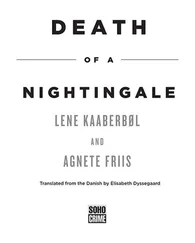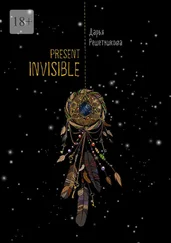Lene Kaaberbol - Invisible Murder
Здесь есть возможность читать онлайн «Lene Kaaberbol - Invisible Murder» весь текст электронной книги совершенно бесплатно (целиком полную версию без сокращений). В некоторых случаях можно слушать аудио, скачать через торрент в формате fb2 и присутствует краткое содержание. Год выпуска: 2012, ISBN: 2012, Издательство: Soho Crime, Жанр: Старинная литература, на английском языке. Описание произведения, (предисловие) а так же отзывы посетителей доступны на портале библиотеки ЛибКат.
- Название:Invisible Murder
- Автор:
- Издательство:Soho Crime
- Жанр:
- Год:2012
- ISBN:9781616951719
- Рейтинг книги:5 / 5. Голосов: 1
-
Избранное:Добавить в избранное
- Отзывы:
-
Ваша оценка:
- 100
- 1
- 2
- 3
- 4
- 5
Invisible Murder: краткое содержание, описание и аннотация
Предлагаем к чтению аннотацию, описание, краткое содержание или предисловие (зависит от того, что написал сам автор книги «Invisible Murder»). Если вы не нашли необходимую информацию о книге — напишите в комментариях, мы постараемся отыскать её.
Invisible Murder — читать онлайн бесплатно полную книгу (весь текст) целиком
Ниже представлен текст книги, разбитый по страницам. Система сохранения места последней прочитанной страницы, позволяет с удобством читать онлайн бесплатно книгу «Invisible Murder», без необходимости каждый раз заново искать на чём Вы остановились. Поставьте закладку, и сможете в любой момент перейти на страницу, на которой закончили чтение.
Интервал:
Закладка:
She stepped on something soft that moved, looked down and discovered the sick boy’s mother, who was already sitting on the sunken floor with the boy in her arms. She cradled the hand Nina had stepped on for a brief moment, then moved deeper into the pit to make room for Nina. The rest of the children from the garage followed in quick succession, and Nina tried automatically to receive the small bodies as they were lifted down to her one by one.
The board was pushed back into place with a heavy, grating sound. The darkness was absolute. Nina could hear the children breathing softly and quickly, but no one said anything. They just sat and listened to the sound of heavy footsteps and voices from the world up above.
Nina tried to calm her breathing. The whole thing had happened so quickly that she hadn’t had a chance to feel scared, but now she could feel her heart pounding fiercely. The pit she was sitting in was easily a meter and a half deep and only just wide enough that she could sit with her legs bent and her back up against the wall. The darkness around her felt dense and suffocating, and the smell of old motor oil tore at her nostrils. A small, warm body touched hers, and she pulled away, startled. But even here in the pulsing darkness, the children were still completely quiet. She got the distinct impression that they had done this before.
The boy with the drip. She had to make sure the mother understood that the infusion bag needed to be held high so the flow wouldn’t be reversed. Nina crawled noiselessly on all fours past the sitting children toward the rear of the pit. It was slow going because apparently the ever-changing inhabitants of the garage had been using the inspection pit for trash disposal for a long time, and the floor was covered in rubble, paper bags, and old plastic bottles. The darkness was dense around her, but now she could make out gray cracks of light between the plywood boards overhead, and about halfway to the back, she finally found the boy’s mother, sitting in complete silence with the child in her arms.
He was asleep. His soft breaths faltered a little each time as he breathed in, and he didn’t respond when she felt her way to the drip in his right arm. The IV tube was positioned correctly despite their rough and rapid retreat into the inspection pit, and Nina felt her way to the bag of saline which was in the woman’s lap—way too low. Nina crawled around to the other side and perched the bag on the woman’s shoulder so it was at least a little higher than the boy.
It seemed as if the mother understood what Nina was trying to do. She lifted the bag in her outstretched arm and held it there, though it must be uncomfortable for her. Everything was still being done without a sound. Above them the boards groaned whenever someone walked over them, and Nina could hear voices. There was some kind of argument, but the sound was muffled and subdued, and she couldn’t understand what was being said.
“ Ápolónö .”
Nina turned in the darkness toward the whispering voice. She had heard the man who had let her into the garage call her the same thing. Ápolónö , nurse. The woman’s voice was so soft and trembling that it almost disappeared in the darkness.
“ Rosszul . Sick. Why?”
The woman flitted like a black shadow just a couple of hand-widths away. She moved nearer.
“I don’t know,” Nina admitted.
She tried to sound calm and soothing. She wanted the woman to shut up. She didn’t know what would happen if they were discovered, but something told her it wouldn’t be good.
“ Ápolónö !”
The woman whispered again and was now so close that Nina could feel the warmth of her breath on her cheek. A thin, boney hand grabbed her arm.
“Please, ápolónö . He die. Please. He die.”
An image from one of the Coal-House Camp’s claustrophobically small family rooms popped into Nina’s mind. Paracetamol to treat mortal fear, she thought. Paracetamol and a saline drip.
“He’ll be fine. Nothing serious.”
Nina tried to sound calm and cheerful and put a reassuring hand on the boy’s stomach. There was a multitude of reasons to fear death in the half-lit world of poverty in which these Roma lived. It was human and totally understandable. Still, Nina could feel the woman’s terror, the darkness, and the cramped space starting to close in around her. The woman’s gaunt hand rested heavily on hers and held on tight. Squeezing her fingers too hard and for too long.
Nina twisted free and pulled away, away from the warm crush of human bodies. She crawled father back into the inspection pit, over heaps of trash, a broken bottle, nuts and bolts, old newspapers, and finally found a small patch of unused floor space all the way down by the wall at the far end. Beneath her sand grated against the concrete floor, and although the fine, small grains dug into the palms of her hands, it was better here.
It had grown quiet up in the garage above them. A door slammed somewhere far away, and after a few minutes, the plywood boards were pulled aside. The light from the lone fluorescent tube fell down into the inspection pit and one by one the children were pulled up. The woman with the sick boy cast a quick glance into the darkness for Nina before she passed the boy up to his father and was herself helped up and out shortly thereafter. The men waved Nina toward the opening. “Come, ápolónö . Boss men gone. Is all OK now.”
N INA STAYED ATthe garage for a few hours.
The boy improved on the saline solution and was awake long enough to eat a couple of crackers and drink half a bottle of juice. He was still pale as a corpse, and the bigger children were complaining of headaches. But all things considered Nina thought the situation was under relative control. She had even managed to clean the trash out of the inspection pit, although she had had to do most of the work herself; she had more luck getting the garage’s residents to help clean up the grounds, which she also insisted on. Maybe they didn’t want her hanging around outside too much; they obviously thought it were best if no one found out she was here.
“Don’t let the children play where the garbage is,” she said, miming and pointing. “Don’t let them put things in their mouths.” She wrote her mobile number on a piece of paper for the boy’s mother. “Call me if he is still sick tomorrow, okay? I have to go now.”
She tried to get the woman to look her in the eye, but whatever connection there might have been between the two of them earlier was gone. The boy’s parents had had a big argument about something, and ever since, the mother had just sat there with the child in her lap, whispering into his soft, dark hair, a low-pitched stream of words that seemed more complaint than comfort.
Nina stood there holding out the slip of paper for several seconds. She felt her old irritation welling up again. Why was it so hard to help these people? They were treating her as a stranger once more, someone to be eyed with mistrust. But just as she was starting to think she would have to leave the note on the ground, the woman took it after all, in a quick, snatching motion, and stuffed it in the pocket of her fleece jacket.
 HERE WAS Akind of Internet café on the ferry to Denmark. Or a computer, at any rate. It had been crammed into a minute glass enclosure that served as a business lounge, and Sándor sat down with the sense of being in forbidden territory. Lord knows there wasn’t much about him right now that was business class. It had taken them two days to hobble their way north through Germany—with a radiator that was being kept artificially alive by Wondarweld cylinder block sealant and frequently adding water—and that had been more than his scant travel wardrobe had been prepared for. He was wearing a pair of recycled underpants that he had been forced to wash in a gas station restroom outside of Teupitz. Under his shirt he was itching incessantly, possibly because of the hair that was growing back after the shaving binge caused by his exam nerves. At any rate, he hoped that was all it was.
HERE WAS Akind of Internet café on the ferry to Denmark. Or a computer, at any rate. It had been crammed into a minute glass enclosure that served as a business lounge, and Sándor sat down with the sense of being in forbidden territory. Lord knows there wasn’t much about him right now that was business class. It had taken them two days to hobble their way north through Germany—with a radiator that was being kept artificially alive by Wondarweld cylinder block sealant and frequently adding water—and that had been more than his scant travel wardrobe had been prepared for. He was wearing a pair of recycled underpants that he had been forced to wash in a gas station restroom outside of Teupitz. Under his shirt he was itching incessantly, possibly because of the hair that was growing back after the shaving binge caused by his exam nerves. At any rate, he hoped that was all it was.
Интервал:
Закладка:
Похожие книги на «Invisible Murder»
Представляем Вашему вниманию похожие книги на «Invisible Murder» списком для выбора. Мы отобрали схожую по названию и смыслу литературу в надежде предоставить читателям больше вариантов отыскать новые, интересные, ещё непрочитанные произведения.
Обсуждение, отзывы о книге «Invisible Murder» и просто собственные мнения читателей. Оставьте ваши комментарии, напишите, что Вы думаете о произведении, его смысле или главных героях. Укажите что конкретно понравилось, а что нет, и почему Вы так считаете.












